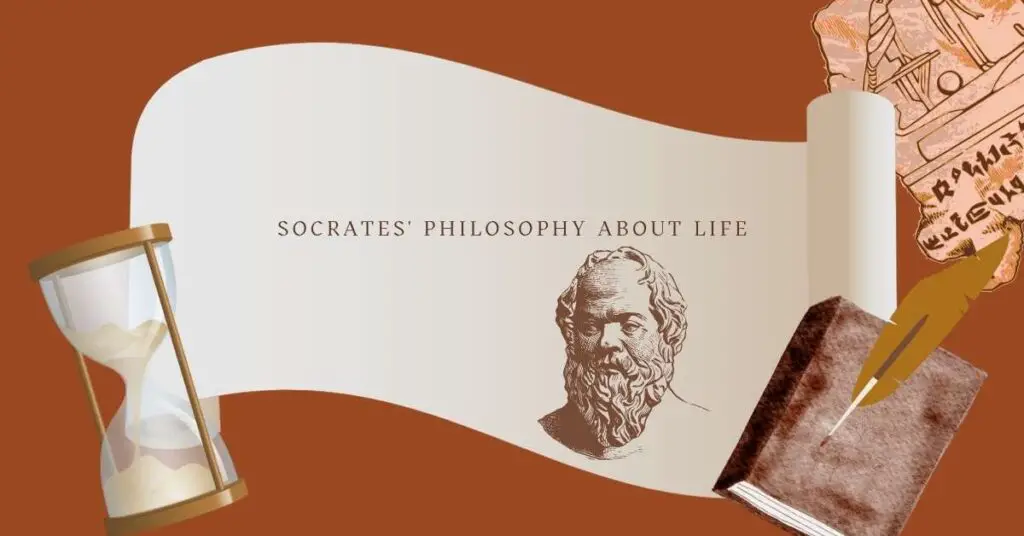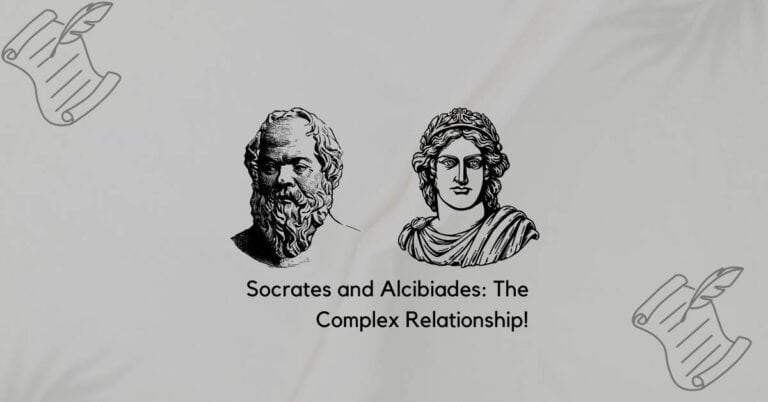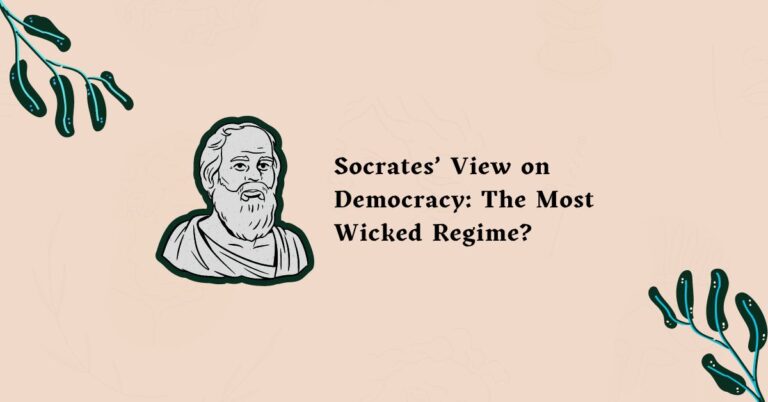Socrates’ Philosophy About Life: The Wisdom of the Ancient Sage!
Socrates wasn’t just another philosopher. He was a game-changer in Western philosophy. Imagine walking the bustling streets of ancient Athens, and there he is, the man himself, engaging folks in deep, thought-provoking conversations. Socrates’ method of inquiry, famously known as the Socratic Method, wasn’t about spoon-feeding answers. Oh no, he was all about asking questions that make you go “Hmm,” pushing you to explore the depths of your own thoughts and beliefs.
Now, why does Socrates’ Philosophy About Life matter today, you ask? Think about it. In a world buzzing with information overload, where answers are often just a Google search away, Socrates invites us to pause and ponder, to question the fabric of our understanding and beliefs. It’s like he’s urging us from centuries ago not just to accept things at face value but to dig deeper and seek our own truths.
Let’s dive on this journey together, exploring Socrates’ Philosophy about life and discovering how his timeless wisdom can guide us through the labyrinth of our own existence.
1. Socrates’ Contributions to Philosophy: The Socratic Method
Socrates (c. 470-399 BCE) made substantial contributions to philosophy, notably through his distinctive approach to teaching and inquiry, now known as the Socratic Method. This method involved asking a series of questions to draw out a person’s underlying beliefs and to expose contradictions in their thoughts, thereby highlighting ignorance on the subject under discussion. Key principles Socrates confidently held include:
- The beginning of wisdom is the recognition of one’s own ignorance.
- An unexamined life is not worth living.
- Ethical virtue is of paramount importance.
- A virtuous person cannot truly be harmed, regardless of external misfortune.
His trial and subsequent death by poisoning for impiety and corrupting the youth of Athens underscore the tensions between individual morality, religious obligation, and state laws, raising questions about democracy and free speech.
You can read this blog to know why Socrates hated democracy.
The Legacy of Socratic Philosophy
Socrates’ philosophical pursuits significantly impacted Western thought, primarily through his method of inquiry, emphasizing the examination of life and virtue. Notably, he never penned his ideas; instead, his philosophy is known through the dialogues of Plato, his most illustrious student, making it challenging to distinguish between Socrates’ and Plato’s thoughts.
Socrates was deeply critical of the Sophists, educators of his time who were charged with teaching rhetoric and logical argumentation, focusing instead on uncovering genuine knowledge. Despite claiming ignorance, Socrates’ approach to dialogue—seeking to reveal logical inconsistencies in his interlocutors’ answers—highlighted his skillful dialectic method. His legacy, markedly advanced by Plato, is a testament to the power of reasoned argument and the quest for understanding virtues such as wisdom, justice, courage, and love.
His life, dedicated to philosophical inquiry without concern for material wealth or societal status, exemplifies his commitment to virtue and the belief that goodness brings wealth, not the other way around. Socrates’ influence persists in the emphasis on critical thinking and self-examination at the heart of Western philosophy.
Integration and Analysis
The Socratic Method, with its emphasis on dialogue, questioning, and the acknowledgment of ignorance, lays a foundational approach to understanding knowledge and ethics. Socrates’ life and methodology offer profound insights into the nature of wisdom, the value of self-examination, and the pursuit of a virtuous life. His enduring legacy, immortalized by Plato, challenges us to think critically, question assumptions, and engage in continuous self-reflection, underscoring the intrinsic link between ethical living and true knowledge.
2. The Pursuit of Virtue and the Good Life
Socrates’s philosophical inquiries deeply explore the concepts of virtue and the good life and the inherent connections between them. His dialogues serve as the primary source of our understanding of his thoughts. Socrates posited that virtue is the highest good and intricately linked virtue to knowledge and the pursuit of the good life. This section will delve into these connections and consider the implications of Socrates’ views on virtue for contemporary ethical discussions.
Socrates’ Belief in Virtue as the Highest Good
Socrates steadfastly maintained that virtue is the highest form of good that one can pursue. Unlike material possessions or external achievements, virtue is seen as an intrinsic value that significantly enriches one’s life. Socrates argued that virtues such as wisdom, courage, moderation, and justice are not only beneficial in themselves but also essential for leading a morally good life. For him, the essence of virtue lay in knowledge – the knowledge of what is good and evil, right and wrong. This perspective suggests that moral ignorance is the root of all wrongdoing and that true knowledge invariably leads to virtuous action.
Connection Between Virtue, Knowledge, and the Good Life
Central to Socratic philosophy is the notion that understanding what constitutes ‘the good’ is paramount to living a virtuous life. Socrates believed that by engaging in continuous questioning and dialogue (the Socratic Method), individuals could achieve a deeper understanding of moral concepts, thereby aligning their actions with the principles of virtue. He famously declared, “The unexamined life is not worth living,” underscoring the importance of self-reflection and intellectual inquiry in the pursuit of a fulfilling life.
For Socrates, knowledge and virtue are intrinsically linked; one cannot truly be virtuous without a profound understanding of the good. Moreover, this understanding is not static but evolves through constant questioning and dialogue. Therefore, the good life, according to Socrates, is achieved by striving for virtue through the continuous pursuit of knowledge.
Socrates’ Views on Virtue
Socrates’ emphasis on virtue and knowledge as pathways to the good life offers valuable insights for contemporary ethical discussions. In an era where moral relativism and the pursuit of external success often overshadow ethical considerations, Socratic philosophy calls for a return to the intrinsic values of virtue and moral wisdom.
- Ethical Decision-Making:
In the context of modern ethical dilemmas, Socrates’ method of dialectical inquiry encourages critical thinking and reflective judgment, prompting individuals to examine their moral assumptions and the consequences of their actions.
- Education:
Socrates’ belief in knowledge as foundational to virtue highlights the importance of education in moral development. It suggests that education should not merely impart information but foster critical thinking, ethical reasoning, and the pursuit of wisdom.
- Personal and Societal Well-being:
Socrates’ equation of the good life with the virtuous life challenges contemporary societies to reassess their values, prioritizing moral integrity, and communal well-being over material wealth and individual success.
In summary, Socrates’ philosophical legacy, with its emphasis on virtue, knowledge, and the pursuit of the good life, remains profoundly relevant. It not only enriches our understanding of ethics but also offers practical guidance for leading meaningful and morally grounded lives in the contemporary world.
3. Socratic Ignorance and the Quest for Wisdom
Socrates was a philosopher who truly knew how to throw a philosophical curveball. Picture this: Athens, a few thousand years back, and Socrates is the man of the hour, but not because he’s spouting facts like a human encyclopedia. Nope, Socrates is all about admitting, “Hey, I don’t have all the answers.” And that, my friends, is where things get interesting.
Socratic Ignorance: Playing Dumb or Genius Move?
Imagine walking up to your friend and saying, “Guess what? I know absolutely nothing!” You’d probably get a weird look, right? But here’s Socrates, making this claim of knowing nada his claim to fame. It’s like he’s the original master of the reverse psychology move, making everyone lean in a bit closer and think harder. He’s not really saying he’s clueless; he’s pointing out that being aware of what we don’t know is the real brain flex.
Why Not Knowing is Half the Battle
Now, think of Socrates as that one friend who never lets you take the easy road in a conversation. “What do you mean?” “Why do you think that?” “Can you explain further?” He’s not being annoying (well, maybe a little); he’s pushing you to dig deeper. He believes that realizing you don’t have all the answers is the first step to truly understanding anything. It’s like acknowledging you’ve lost your way a bit before you can start finding the right path.
Today’s World Through Socratic Glasses
Fast forward to today, where we’re swimming in a sea of information, courtesy of our friend the internet. Socrates’ love for admitting ignorance is like a breath of fresh air. It reminds us that it’s okay not to have a Wikipedia page for a brain. Instead of trying to know it all, asking more questions and keeping that curiosity alive is where it’s at. It’s like choosing a meaningful conversation over just rattling off facts.
- Curiosity Over Content:
In a world where everyone’s trying to out-fact each other, being the person who asks, “But why?” stands out.
It’s not about the trivia you’ve memorized; it’s about the questions you’re brave enough to ask.
- Think Before You Tweet:
With everyone quick to share their hot takes on social media, a dose of Socratic thinking could go a long way. Imagine pausing to question your own stance before hitting that post button. Revolutionary, right?
- Deep Dives Over Skimming:
Instead of just scratching the surface, why not take a deep dive into topics? Socrates is all about that life—the life of deep, meaningful explorations, not just quick info grabs.
So, next time you find yourself in a debate or just pondering life’s big questions, remember: admitting you don’t know everything is not a step back; it’s a giant leap towards understanding. With his knack for stirring the pot and making people think, Socrates was really onto something. And who knows? Embracing a bit of Socratic ignorance might just be the wisest thing we can do.
4. Socrates on the Soul and the Afterlife
Socrates wasn’t the kind of guy to chat about the weather or what he had for breakfast. No, he was all about the big questions. And when it comes to big-ticket items, what’s bigger than chatting about the soul and the afterlife?
Socrates’ Take on the Soul: Eternal and Ethical
So, here’s the scoop: Socrates believed our souls were on a never-ending journey, way before TikTok and centuries after. He thought the soul didn’t punch out after we did; it was more like it kept rolling on to the next adventure. For Socrates, the soul was immortal, meaning it wasn’t just a one-and-done deal in life.
But Socrates didn’t just stop there. He linked this whole immortal soul business to how we live our lives. He figured that if our souls are sticking around longer than the leftovers in our fridge, we’d better make sure we’re living right. Ethics, doing good, being just – all these were top-of-the-mind for our buddy because they polished the soul, making it ready for its next cosmic gig.
Living the Good Life, Socrates-Style
So, how did Socrates’ soulful musings shape his life philosophy? Well, he was convinced that taking care of the soul was job number one. This wasn’t about spa days for the spirit but about nurturing virtue, wisdom, and all-around goodness. In Socrates’ world, jamming out to the latest hit or scoring cool points didn’t stack up to the eternal well-being of the soul.
He argued that understanding what’s truly valuable and moral was the key to a well-tuned soul. This is where his famous saying, “An unexamined life is not worth living,” comes into play. It’s like he’s saying, “Hey, let’s not sleepwalk through life. Let’s think about what makes us good and keeps our souls in tip-top shape for eternity.”
What Socrates Means for Us Today
Fast forward to now, and Socrates’ ideas about the soul and the afterlife still have us chin-stroking and pondering deep thoughts. In a world where the latest gadgets and gizmos often drown out deeper discussions about life’s meaning, Socrates throws us a philosophical lifeline.
Reflecting on our soul’s health and what lies beyond our Netflix binge sessions invites us to consider what we value most. Are we focusing on what truly nourishes our inner selves? Are our daily choices reflecting a life that’s aiming for something more profound than just the next big thing?
Socrates nudges us to explore these questions, not through fear of what’s to come, but through a hopeful vision of our potential for growth and virtue. It’s about living a life that’s not just good for the ‘gram but good for the soul.
So, as we navigate the complexities of modern life, perhaps keeping a little Socratic wisdom in our back pocket isn’t such a bad idea. It’s about looking inward, asking tough questions, and living in a way that makes our souls ready for whatever adventure comes next. After all, if our souls are on an eternal journey, we might as well make it a journey worth taking.
5. The Legacy of Socrates in Modern Philosophy
As we wrap up our journey through the philosophical landscape shaped by Socrates, it’s clear his footprint on the sands of time is more like a deep, indelible mark. From stirring the pot in ancient Athens to echoing through the halls of modern philosophy, Socrates has been a guiding star for thinkers, dreamers, and anyone who’s ever paused to ponder the “why” behind it all.
Socrates’ Influence: The Ripple Effect
Think of Socrates as the original influencer in the realm of thought. His way of questioning everything, from the meaning of virtue to the essence of existence, laid the groundwork for centuries of philosophical inquiry. Philosophers like Plato and Aristotle directly inherited his intellectual DNA, wrestling with the ideas he brought into the world and nurturing them into their own philosophies.
But Socrates’ influence didn’t stop in ancient Greece. Fast forward a few millennia, and his fingerprints are all over existentialism, ethics, political theory, and more. He’s the philosophical gift that keeps on giving, inspiring folks like Descartes, Kant, and Nietzsche to dive deep into the nature of reality, morality, and the human condition.
Carrying the Torch: Socrates in the 21st Century
Socrates teaches us that philosophy isn’t just for academics or bookworms—it’s for everyone. His legacy invites us to keep the flame of inquiry burning by asking tough questions, seeking authentic answers, and embracing the journey of personal growth. In a way, we’re all philosophers, navigating the mysteries of existence with each step we take.
As we ponder the legacy of Socrates, let’s remember that his philosophy is not just about reflecting on life; it’s a call to action. To engage with Socratic questioning is to actively participate in the shaping of our own lives and the world around us. It’s an encouragement to live intentionally, with eyes wide open to the wonder and complexity of the human experience.
Conclusion:
Reflecting on Socrates’ enduring relevance, we find a philosophy that’s as alive today as it was in the bustling streets of Athens. His teachings challenge us not just to pass through life but to engage with it deeply and thoughtfully. In doing so, we honor his legacy and enrich our own journey.
So, let’s take up Socrates’ invitation to question, to wonder, and to seek. Let’s make our lives a testament to the power of an examined existence. After all, in the quest for meaning and understanding, the Socratic path is one that promises not just answers but a richer, fuller experience of life itself.
As we continue our search for truth in the complexities of the 21st century, may the spirit of Socrates guide us. In a world hungry for depth and meaning, his philosophy remains a beacon of light, urging us on toward a thoughtful and examined life.



